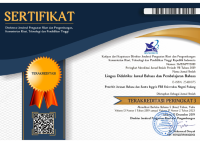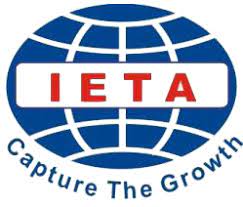INTERSENTENTIAL CODESWITCHING AMONG INDONESIAN-ENGLISH BILINGUALS
 ),
), (1) English Department, Faculty of Languages Literature and Arts Padang State University
 Corresponding Author
Corresponding Author
Copyright (c) 2017 Lingua Didaktika: Jurnal Bahasa dan Pembelajaran Bahasa
DOI : https://doi.org/10.24036/ld.v3i2.7373
Full Text:
 Language : en
Language : en
Abstract
This study is aimed at investigating how the English-Indonesian bilingual speakers use language codes in their interaction through internet. The data for this study comprised a linguistic corpus made up from postings send to a newsgroup by its members. The findings showed that codeswitching accured in this forum was similar to that in the face to face interaction. The code choice may be either marked or unmarked. The unmarked switching occured during informal and relax interaction. While the marked switching occured when the speakers wanted to negotiate a new right and obligation, specifically when they wanted to show anger, attract attention, make correction or invite another speaker to join.
Keywords
References
Abdullah, P. 1979. “Some observation on codeswitching among Malay-English Bilinguals. in Beardsmore” in Hugo Baeten. Bilingualism: Basic principles. London: Bilingual Matters
Baustista, Maria Lourdes S. The Filipino Bilingual’s Competence: A Model Based on an Analysis of Tagalog-English Code Switching. Canberra: ANU
Bennett, Falk. 1994. The internet roadmap. San Fransisco: Sybex.
Burt, Susan Meredith. 1992. “Codeswitching, convergence and compliance: The development of micro-community speech norms” in Journal of multilingual and multicultural. 13/1-2
Fuller, Janet. 1993. “Hearing between the Line: Style Switching in a Courtroom Setting” in Pragmatics 3:1. 29-43
Gal, S. 1979. Language Shift: Social determinants of linguistic change in Bilingual Austria. New York: Academic Press
Gibbons, John. 1987. Code mixing and code choice. London: Multilingual matters
Grosjean, François. 1982. Life with Two Languages: An Introduction to Bilingualism. Cambridge: Harvard University Press
Gumperz. J. “Conversational codeswitching” in J Gumpertz. Discourse Strategies. Cambridge: CUP
Hahn, Harley & Stout, Rick. 1994. The internet yellow pages. Berkeley: Osborne McGrow-Hill
Heath, Jeffrey. 1989. From Code-Switching to Borrowing: Foreign and Diglossic Mixing in Moroccan Arabic. London: Kegan Paul International
Hoffmann, Charlote. 1991. An Introduction to Bilingualism. London: Longman
McClure, E. 1981. “Formal and Functional aspects of code switched discourse of bilingual children” in R. Duran. Latino language and communicative behavior. New Jersey: Ablex
Meisel, Jürgen M. 1994. Code-Switching in Young Bilingual Children: The Acquisition of Grammatical Constrains. Cambridge: Cambridge University Press
Mustafa, Zahra & Mahmoud Al-Khatib. 1994. “Code-mixing of Arabic and English in teaching science” in World Englishes. Vol.13 No.2.pp.215-224
Myers-Scotton, Carol. 1993. “Building the Frame in Codeswitching Evidence from Africa” in Mufwene, Salikiko S. and Moshi, Lioba. Current Issues in Linguistic Theory: Topics in Africa Lingustics. Amsterdam: John Benyamin Publishing
Myers-Scotton, Carol. 1992. “Constructing the Frame in Intrasential Codeswitching” in Multilingua 11-1, 101-127.
Pakir, Anne. 1989. “Linguistic alternants and code selection” in Baba Malay. World Englishes. 8/3
Pan, Barbara Alexander. 1995. “Code Negotiation in Bilingual Families: ‘My Body Starts Speaking English” in Journal of multilingual and multicultural development. Vol.16. No.4
Pennington, Martha c. et al. 1992. Toward a model of language choice among Hong Kong tertiary students: A Primari analysis. Hong Kong: City polytechnic
Romaine, S. 1989. Bilingualism. Blackwell
Scotton, Carol Myers. 1993. “Common and uncommon ground: Social and structural factors in codeswitching” in Language in Society. 22/3
Scotton, Carol Myers. 1988. “Codeswitching as indexical of social negotiation’ in Monica Heller (ed). Codeswitching: Anthropological and sociolinguistic perspectives. Berlin: Mouton de Gruyter.
Scotton, Carol Myers. 1983. “The negotiation of identitied in conversation: A theory of markedness and code choice” in International Journal of the Sociology of Language. 1983. 44
Sgall, Petr & Jiri Hronik.1993. “Speakers attitude towards codeswitching” in Eva Eckert (ed). Varieties of Check: studies in Check sociolinguistics. Netherland: Rodopi.
Shields-Brodber, Kathryn. 1992. “Dynamism and Assertiveness in the Public Voice: Turn-Talking and Code-Switching in Radio Talk Shows in Jamaica” in Pragmatics 2:4 pp.487-504
Sounkalo, Jiddou. 1995. “Code-Switching as Indexical of Native Language Lexical Deficiency” in Mauritania. Journal of Multilingual and Multicultural Development. Vol. 16. No.5
Treffers-Daller, Jeanine. 1992. “French-Dutch code switching in Brussels: Social factors explaining its disappearance” in Journal of multilingual and Multicultural Development. 13
Wei, Li. 1995. Three Generation. Two Languages, One Family: Language Choice and Language Shift in a Chinese Community in Britain. London: Multi lingual matters.
 Article Metrics
Article Metrics
 Abstract Views : 624 times
Abstract Views : 624 times
 PDF Downloaded : 167 times
PDF Downloaded : 167 times
Refbacks
- There are currently no refbacks.
Copyright (c) 2017 Lingua Didaktika: Jurnal Bahasa dan Pembelajaran Bahasa

This work is licensed under a Creative Commons Attribution-NonCommercial 4.0 International License.








